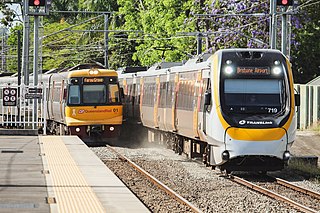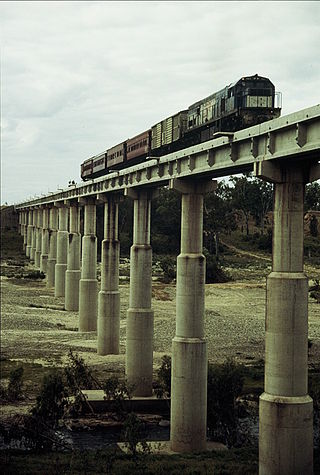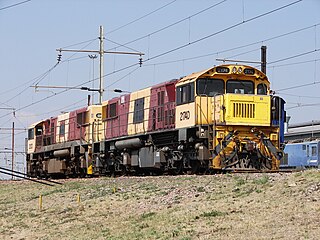| Class | Image | Type | Top speed
(km/h) | Built | Number | Business unit | Use and area of operation | Notes |
| 1435 mm (4 ft 8+1⁄2 in) Standard gauge fleet |
|---|
| 5000 |  | Diesel-electric | 80 | 2005–2007 | 12 | Aurizon | Hunter Valley coal | |
| 5020 |  | Diesel-electric | 80 | 2010–2014 | 25 | Aurizon | Hunter Valley coal | Improved version of 5000 class |
| 6000 |  | Diesel-electric | 115 | 2009 | 12 | Aurizon | Hunter Valley coal | Ex QR National. |
| 6020 | | Diesel-electric | 115 | 2012 | 9 | Aurizon | Hunter Valley coal | 6022, 6023 & 6025 allocated to Bulk Central/Intermodal |
| 6040 | | Diesel-electric | 115 | 2017–2018 | 5 | Aurizon | Hunter valley coal | |
| CF | | Diesel-electric | 115 | 2012–2013 | 2 | Aurizon | Hunter Valley coal | Ex CFCL Australia |
| 422 |  | Diesel-electric | 115 | 1969–1970 | 7 | Aurizon Bulk Central/West | South Australia/Northern Territory/Western Australia | 4 Ex One Rail Australia 3 Stored at Forrestfield Aurizon |
| CLF |  | Diesel-electric | 115 | 1970 | 2 | Aurizon Bulk Central | South Australia/Northern Territory | Ex One Rail Australia |
| ALF/ ALZ |  | Diesel-electric | 115 | 1976 | 8 | Aurizon Bulk Central | South Australia/Northern Territory | 1 Ex Australian Railroad Group, Scrapped. 7 Ex One Rail Australia |
| CLP |  | Diesel-electric | 115 | 1970 | 4 | Aurizon Bulk Central | South Australia/Northern Territory | Ex One Rail Australia |
| J |  | Diesel-electric | 62 | 1966 | 3 | Aurizon Bulk Central | Northern Territory - Alice Springs | Ex One Rail Australia 2x Former Alice Springs Shunt Locos, now stored in Dry Creek with mechanical troubles and vandalism damage from Alice Springs |
| AC |  | Diesel-electric | 115 | 2009 | 8 | Aurizon Bulk Freight West | Western Australia | Ex Australian Railroad Group |
| ACB | | Diesel-electric | 115 | 2011 | 6 | Aurizon Bulk Freight West | Western Australia | Ex Australian Railroad Group |
| ACC | | Diesel-electric | 115 | 2013 | 3 | Aurizon Bulk Freight West | Western Australia | ACC6032 Allocated to Bulk Central/Intermodal |
| ACD | | Diesel-electric | 115 | 2022-2023 | 15 | Aurizon Bulk Central | NSW, Interstate mineral sands | ACD6041 - ACD6047 & ACD6050 - ACD6055 allocated to Intermodal |
| G |  | Diesel-electric | 115 | 1981-1989 | 2 | Aurizon Bulk Central | South Australia/Northern Territory | Ex One Rail Australia |
| GM |  | Diesel-electric | 115 | 1965-1967 | 9 | Aurizon Bulk Central | South Australia/Northern Territory | Ex One Rail Australia |
| GWA |  | Diesel-electric | 115 | 2011-2012 | 9 | Aurizon Bulk Central | South Australia/Northern Territory | Ex One Rail Australia |
| GWB | | Diesel-electric | 115 | 2019-2022 | 6 | Aurizon Bulk Central | South Australia/Northern Territory | 3 ex One Rail Australia, 3 delivered to Aurizon. |
| GWU |  | Diesel-electric | 115 | 2020-2021 | 4 | Aurizon Bulk Central | South Australia/Northern Territory | Ex One Rail Australia |
| L |  | Diesel-electric | 115 | 1967 | 1 | Aurizon Bulk Freight West | Western Australia | Ex Australian Railroad Group, 1 stored |
| LQ |  | Diesel-electric | 115 | 1967 | 2 | Aurizon Bulk Freight West | Western Australia | 1 Ex Australian Railroad Group, 1 ex Interail, stored at Avon Yard |
| LZ |  | Diesel-electric | 115 | 1967 | 6 | Aurizon Bulk Freight West | Western Australia | Ex Australian Railroad Group |
| Q |  | Diesel-electric | 115 | 1997 | 23 | Aurizon Bulk Freight West | Western Australia | Ex Australian Railroad Group 4 Ex One Rail Australia (FQ Class) |
| 3200 |  | Diesel-electric | 100 | 1995–1998 | 3 | Aurizon | New South Wales | Regauged from 3 ft 6 in (1,067 mm) gauge |
| Queensland 1067 mm (3 ft 6 in) narrow-gauge fleet |
|---|
| 1720 |  | Diesel-electric | 80 | 1966–1970 | 28 | Aurizon | General freight and shunting | 16 other units sold to South Africa in 2012, 8 stored |
| 2000 | | Railmotor | 80 | 1960–1970 | 2 | Aurizon Network | Queensland network track inspections | Nos. 2004 and 2032 |
| 2100 | | Diesel-electric | 80 | 1970–1984 | 53 | Aurizon | General freight and minerals | 5 other units transferred to Western Australia as the DD class (see below), 4 other units sold to TasRail in 2011, 3 to South Africa in 2012, 2 stored for parts |
| 2300 |  | Diesel-electric | 100 | 1997–2002 | 51 | Aurizon | General freight and minerals, 7 other units in Western Australia as DFZ class (see below) | Rebuilt from 1550 class |
| 2400 | | Diesel-electric | 100 | 1977–1980 | 38 | Aurizon | General freight and minerals | 18 converted to 2300 class 1 stored |
| 2700 | | Diesel-electric | 110 | 2019–present | 6 in service | Aurizon | General freight and minerals | These locomotives are dubbed the Super Clyde. These are rebuilt from older locomotives. |
| 2800 |  | Diesel-electric | 100 | 1995–1998 | 46 | Aurizon | General freight and minerals | 3 other units on standard gauge (see above), 1 other unit in Western Australia as PA class (see below) |
| 4000 | | Diesel-electric | 100 | 2000–2005 | 49 | Aurizon Coal | Blackwater and Moura coal networks | 4020 scrapped |
| 4100 |  | Diesel-electric | 100 | 2007–2012 | 56 | Aurizon Coal | Blackwater, Moura and Newlands coal networks | Originally 75 units, 19 units transferred to Western Australia as ACN class |
| 3100/3200 |  | Electric | 80 | 1986–1989 | 15 | Aurizon Coal | Bowen Basin | 63 rebuilt as 3700 class (see below), 4 other units sold to South Africa in 2012–2013, Remaining units scrapped during May and June 2016 |
| 3300/3400 | | Electric | 80 | 1994–1995 | 13 | Aurizon Coal | Blackwater coal network | Stored |
| 3500/3600 |  | Electric | 80 | 1986–1988 | 68 | Aurizon Coal | Goonyella coal network | 15 stored |
| 3551 | | Electric | 80 | 2003–2004 | 14 | Aurizon Coal | Blackwater coal network | Rebuilt from 3900 class |
| 3700 |  | Electric | 80 | 2005–2007 | 63 | Aurizon Coal | Goonyella and Blackwater coal networks | Rebuilt from 3100/3200 class |
| 3800 |  | Electric | 80 | 2008–2010 | 45 | Aurizon Coal | Goonyella and Blackwater coal networks | |
| 3900 |  | Electric | 100 | 1988-90 | 11 | Aurizon Coal | Blackwater coal network | Stored |
| Western Australia 1067 mm (3 ft 6 in) narrow-gauge fleet |
|---|
| A | | Diesel-electric | 100 | 1960 | 1 | Aurizon Bulk Freight West | Western Australia | Ex Australian Railroad Group, 1 other unit exported to South Africa in January 2015. |
| AB | | Diesel-electric | 100 | 1970 | 2 | Aurizon Bulk Freight West | Western Australia | Ex Australian Railroad Group. 2 other units exported to South Africa in January 2015. |
| ACN | | Diesel-electric | 100 | 2011–2012 | 19 | Aurizon Bulk Freight West | Western Australia | Originally part of 4100 class, transferred to Western Australia and retained their original numbers |
| D |  | Diesel-electric | 100 | 1971 | 1 | Aurizon Bulk Freight West | Western Australia | Ex Australian Railroad Group, 1 other unit exported to South Africa in January 2015. |
| DA | | Diesel-electric | 100 | 1971 | 3 | Aurizon Bulk Freight West | Western Australia | Ex Australian Railroad Group |
| DAZ | | Diesel-electric | 100 | 1971 | 1 | Aurizon Bulk Freight West | Western Australia | Ex Australian Railroad Group, 5 other units exported to South Africa in January 2015. |
| DB | | Diesel-electric | 100 | 1982 | 5 | Aurizon Bulk Freight West | Western Australia | Ex Australian Railroad Group |
| DBZ |  | Diesel-electric | 100 | 1982 | 5 | Aurizon Bulk Freight West | Western Australia | Ex Australian Railroad Group |
| DD | | Diesel-electric | 100 | 1970–1984 | 5 | Aurizon Bulk Freight West | Western Australia | Converted from 2100 class |
| DFZ | | Diesel-electric | 100 | 1971 | 7 | Aurizon Bulk Freight West | Western Australia | Converted from 2300 class |
| P |  | Diesel-electric | 100 | 1989–1991 | 13 | Aurizon Bulk Freight West | Western Australia | Ex Australian Railroad Group |
| PA |  | Diesel-electric | 100 | 1996 | 1 | Aurizon Bulk Freight West | Western Australia | Converted from 2800 class |
| S | | Diesel-electric | 90 | 1996 | 11 | Aurizon Bulk Freight West | Western Australia | Ex Australian Railroad Group |
| South Australia 1067 mm (3 ft 6 in) narrow-gauge fleet |
|---|
| 830 |  | Diesel-electric | 121 | 1960-1966 | 5 | Aurizon Bulk Central | Thevenard, South Australia | Ex One Rail Australia, all stored. Last 2 operational units placed into storage April 2023 with the arrival of two 2300 class from Queensland |
| 900 |  | Diesel-electric | 121 | 1960-1966 | 7 | Aurizon Bulk Central | Thevenard, South Australia | Ex One Rail Australia, all stored. Rebuilt from 830 and NSW 48 class locomotives. Last 3 operational units placed into storage April 2023 with the arrival of two 2300 class from Queensland |
| 1200 |  | Diesel-electric | 100 | 1960-1967 | 2 | Aurizon Bulk Central | Thevenard, South Australia | Ex One Rail Australia, ex WAGR A class. Stored serviceable as backup units for the Gypsum train |
| 1300 |  | Diesel-electric | Unknown | 1956-1965 | 4 | Aurizon Bulk Central | Whyalla, South Australia | Ex One Rail Australia, ex BHP Whyalla DE Class |
| 1600 |  | Diesel-electric | Unknown | 1971 | 3 | Aurizon Bulk Central | Thevenard, South Australia | Ex One Rail Australia, formerly the NJ class. 3 stored, 2 stored serviceable as backup locos for the 2300 class in Thevenard. |
| 2250 |  | Diesel-electric | 100 | 2004 | 5 | Aurizon Bulk Central | Whyalla, South Australia | Ex One Rail Australia, repatriated from South Africa in 2019 and owned by Aurizon beforehand. |
| 2300 |  | Diesel-electric | 100 | 1997–2002 | 2 | Aurizon Bulk Central | Thevenard, South Australia | 2332 and 2364 trucked to Thevenard in March 2023. Both entered service on 13/04/2023. |
| CK |  | Diesel-electric | 100 | 1967-1968 | 4 | Aurizon Bulk Central | Whyalla, South Australia | Ex One Rail Australia, former Victorian Railways T class |



























































